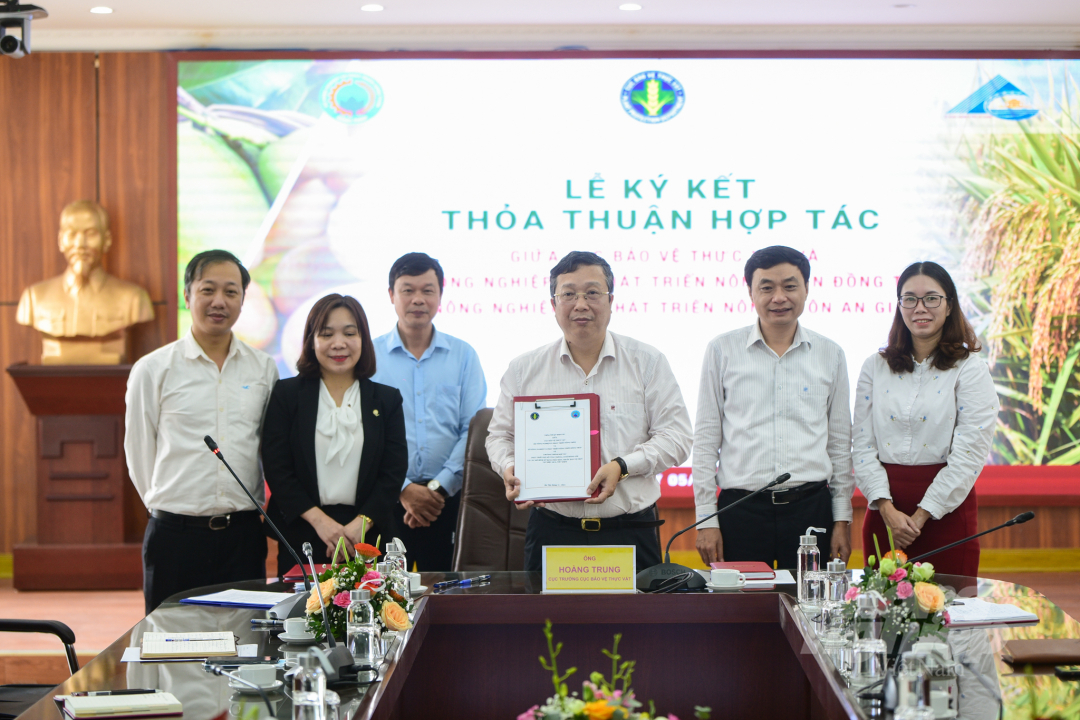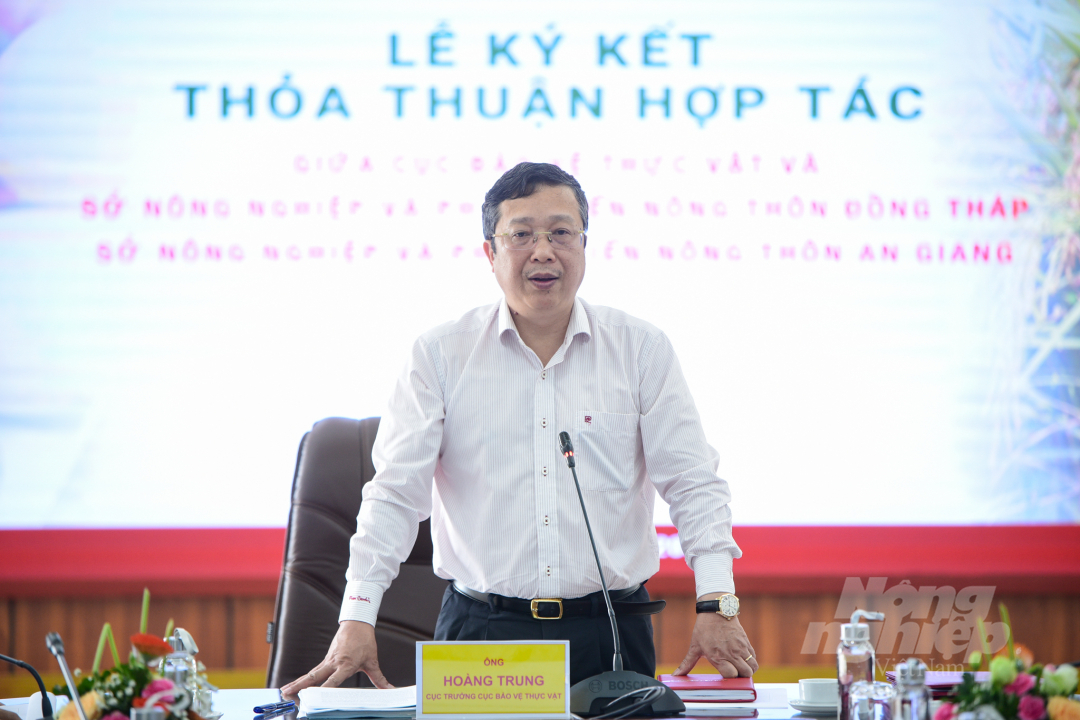November 2, 2025 | 17:30 GMT +7
November 2, 2025 | 17:30 GMT +7
Hotline: 0913.378.918
November 2, 2025 | 17:30 GMT +7
Hotline: 0913.378.918

The Plant Protection Department has signed an agreement with provincial Departments of Agriculture and Rural Development of Dong Thap and An Giang on the development of planting area codes and effective use of inputs for agricultural products. Photo: Tung Dinh.
The Plant Protection Department (PPD) and the Departments of Agriculture and Rural Development (DARD) of Dong Thap and An provinces signed on November 5 a cooperation agreement on: "Development of growing area codes and models of using fertilizers and pesticides economically and effectively for key crops with export potential in Dong Thap and An Giang provinces”.
The cooperation agreement was signed by Mr. Hoang Trung, Director of the PPD, Mr. Nguyen Phuoc Thien, DARD Director of Dong Thap, and Mr. Nguyen Si Lam, DARD Director of An Giang under the witness of Deputy Minister of Agriculture and Rural Development (MARD) Tran Thanh Nam.
An Giang and Dong Thap are rich lands in the Mekong Delta, with many advantages and potentials for export agricultural products. Dong Thap is famous for many typical agricultural products such as rice, mango, tangerine and plum while An Giang is one of the leading provinces supplying large amounts of vegetables to the Mekong Delta markets. An Giang rice has now been exported to 38 countries around the world.
Speaking at the signing ceremony, MARD Deputy Minister Tran Thanh Nam praised the Plant Protection Department and two provinces, notably PPD Director Hoang Trung and two DARD Directors of An Giang and Dong Thap.
The Deputy Minister said that MARD is drastically directing the development of growing area codes for material areas to ensure both exports and domestic consumption, so today's signing has a “great meaning”.
“For the market demands, issues about product traceability and food safety are increasingly concerned by consumers, so it is necessary to develop growing area codes for raw material areas. An Giang and Dong Thap are localities with many key agricultural products such as fruits, rice, and pangasius, thus after today's signing, we can not only deploy in two provinces but also expand to many other locations," emphasized the Deputy Minister.
Directing further on the implementation orientation, Nam suggested the localities need to develop a detailed plan revolving around three contents after the signing ceremony.
“The ministry is building large material areas in An Giang, Dong Thap, and some other provinces in the Mekong Delta with a total area of more than 150,000 hectares. Therefore, the Department of Plant Protection should give priority to granting growing area codes to these areas so that they can focus resources on development, creating large-scale standard material areas," said Nam.
In addition, the Deputy Minister noted that the PPD needs to work closely with the National Center for Conservation of Nature to effectively implement the plan and be ready to replicate it in many other localities. The third content that Deputy Minister Tran Thanh Nam mentioned is the need to promote the participation of businesses in increasing resources and efficiency of the agreements.

PPD Director Hoang Trung receives directions from MARD Deputy Minister Tran Thanh Nam. Photo: Tung Dinh.
Up to now, the PPD has supported An Giang to open a training class for developing the growing area codes in rice growing and has selected eight pilot rice growing models, as well as run two training courses on granting the growing area codes for fruit trees in two provinces right after the signing.
Therefore, this agreement aims to promote the strengths of each party in jointly developing growing area codes and implementing models of economical and effective use of fertilizers and pesticides in different main crops with export potentials in the two provinces. This is also to contribute to the provincial agricultural economic development in the direction of an open market with efficiency, sustainability, and adaptation to climate change.
Under the agreement, the parties will coordinate to develop a compile of training documents on growing area codes and packaging facilities for key crops with export potential such as rice, fruit trees and vegetables in An Giang and Dong Thap, which includes guidance on fertilizers and pesticides management, a monitoring program for pesticide residues and collection of pesticide bags in the growing areas.
At the same time, they will coordinate in technical training for staff, enterprises, and farmers on the management, responsibility, and use of input materials for agricultural production (seeds, pesticides and fertilizers,..), package collection, growing area code, and packaging…
Besides, they will set up and attach codes to growing areas and packaging facilities eligible for export. The parties will closely coordinate in the management of growing areas and packaging facilities, and promote an opening market for key products with export potential in the localities. Thereby, they will promote the production and consumption of high-quality and high-value products in the two provinces of An Giang and Dong Thap.
Also under the agreement, the parties will coordinate in building a model of using organic fertilizers and biological pesticides. Accordingly, deploying and developing models of safe, responsible and effective use of fertilizers and pesticides are necessary with the aims to reduce input costs, increase values and quality of agricultural products meeting demands of the local development, towards sustainable and multi-valued production.
In the period between 2021-2025, it is expected that 100% of farmers in growing areas granted codes in An Giang and Dong Thap will be trained on knowledge of growing area codes and the use of fertilizers and pesticides.
An Giang Province has strived to grant codes to 30 packaging facilities, 699 rice-growing areas, 530 vegetable growing areas, and 617 fruit tree areas with a total area of 187,421ha. It has also pledged to develop 37 models of rice cultivation, 14 models of vegetables and eight models of fruit trees with reasonable use of materials, increasing the efficiency, reducing costs, products traceability and quality management to meet inquiries for exports.
Similarly, Dong Thap Province has also strived to attach 25 area codes for packing facilities, 131 for rice growing, 56 for vegetable growing, 324 for fruit growing, in a total area of 62,484 ha. Growing area codes have also been targeted to grant to 25 models of rice, 23 models of vegetables and 58 models of fruit trees. These models have all registered for the planting area codes.
The parties shared a hope that the above activities will be increasingly promoted and spread, creating many effective and safe production models of rice, vegetables, and fruits so that to contribute to the development of a clean, chain-linked, high-value and sustainable agriculture in the two provinces of An Giang and Dong Thap.
Translated by Linh Nguyen

(VAN) Out of over 20 chicken farms in Trung Cao hamlet (Phu Nghia commune, Hanoi), only those of Pham Thi Le and Pham Van Thuc still pursue this rare trade.

(VAN) Kim Anh commune (Hanoi) has proactively implemented measures to protect livestock herds, maintaining a “safety shield” for local livelihoods.

(VAN) Farmers in Tuyen Quang are effectively adopting the contact-free livestock model to control pathogens and keep their pig herds safe.

(VAN) Phu Tho is promoting the development of specialty fruit-growing areas following VietGAP and GlobalGAP standards, with planting area codes and traceability systems, aiming toward a green and sustainable agriculture.

(VAN) After years of intensive cultivation, agricultural soils are becoming exhausted. Efforts to restore soil health and regenerate soil ecosystems are now being initiated.

(VAN) Expanding the smart coffee cultivation model not only contributes to increasing farmers’ income but also enhances climate change adaptation in the Central Highlands.

(VAN) A comprehensive MRV process for high-quality rice cultivation has been finalized and is now ready to accurately measure and assess emission reductions.